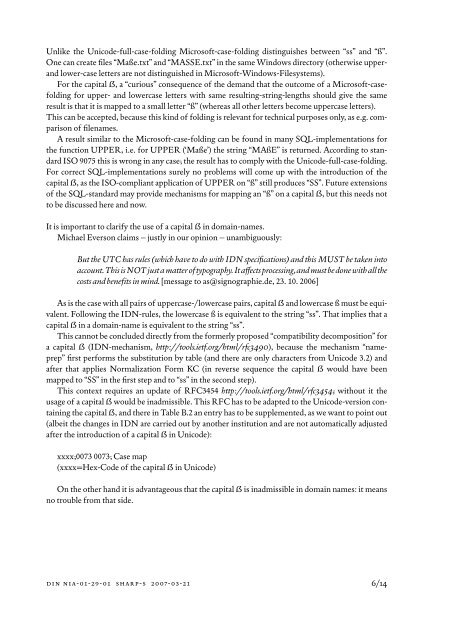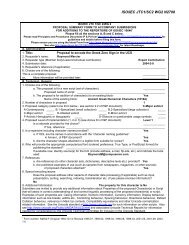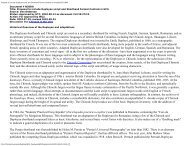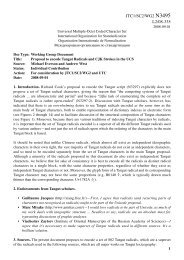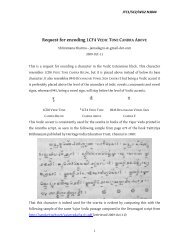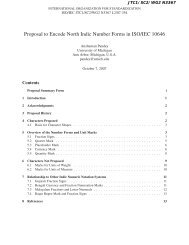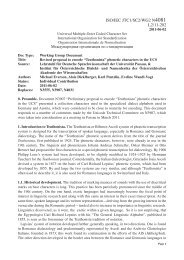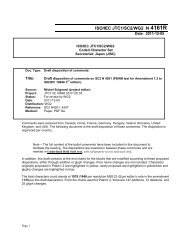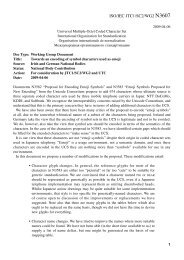Proposal to encode Latin Capital Letter Sharp S - FTP Directory ...
Proposal to encode Latin Capital Letter Sharp S - FTP Directory ...
Proposal to encode Latin Capital Letter Sharp S - FTP Directory ...
Create successful ePaper yourself
Turn your PDF publications into a flip-book with our unique Google optimized e-Paper software.
Unlike the Unicode-full-case-folding Microsoft-case-folding distinguishes between “ss” and “ß”.<br />
One can create files “Maße.txt” and “MASSE.txt” in the same Windows direc<strong>to</strong>ry (otherwise upperand<br />
lower-case letters are not distinguished in Microsoft-Windows-Filesystems).<br />
For the capital $, a “curious” consequence of the demand that the outcome of a Microsoft-casefolding<br />
for upper- and lowercase letters with same resulting-string-lengths should give the same<br />
result is that it is mapped <strong>to</strong> a small letter “ß” (whereas all other letters become uppercase letters).<br />
This can be accepted, because this kind of folding is relevant for technical purposes only, as e.g. comparison<br />
of filenames.<br />
A result similar <strong>to</strong> the Microsoft-case-folding can be found in many SQL-implementations for<br />
the function UPPER, i.e. for UPPER (‘Maße’) the string “MAßE” is returned. According <strong>to</strong> standard<br />
ISO 9075 this is wrong in any case; the result has <strong>to</strong> comply with the Unicode-full-case-folding.<br />
For correct SQL-implementations surely no problems will come up with the introduction of the<br />
capital $, as the ISO-compliant application of UPPER on “ß” still produces “SS”. Future extensions<br />
of the SQL-standard may provide mechanisms for mapping an “ß” on a capital $, but this needs not<br />
<strong>to</strong> be discussed here and now.<br />
It is important <strong>to</strong> clarify the use of a capital $ in domain-names.<br />
Michael Everson claims – justly in our opinion – unambiguously:<br />
But the UTC has rules (which have <strong>to</strong> do with IDN specifications) and this MUST be taken in<strong>to</strong><br />
account. This is NOT just a matter of typography. It aƒects processing, and must be done with all the<br />
costs and benefits in mind. [message <strong>to</strong> as@signographie.de, 23. 10. 2006]<br />
As is the case with all pairs of uppercase-/lowercase pairs, capital $ and lowercase ß must be equivalent.<br />
Following the IDN-rules, the lowercase ß is equivalent <strong>to</strong> the string “ss”. That implies that a<br />
capital $ in a domain-name is equivalent <strong>to</strong> the string “ss”.<br />
This cannot be concluded directly from the formerly proposed “compatibility decomposition” for<br />
a capital $ (IDN-mechanism, http://<strong>to</strong>ols.ietf.org/html/rfc3490), because the mechanism “nameprep”<br />
first performs the substitution by table (and there are only characters from Unicode 3.2) and<br />
after that applies Normalization Form KC (in reverse sequence the capital $ would have been<br />
mapped <strong>to</strong> “SS” in the first step and <strong>to</strong> “ss” in the second step).<br />
This context requires an update of RFC3454 http://<strong>to</strong>ols.ietf.org/html/rfc3454; without it the<br />
usage of a capital $ would be inadmissible. This RFC has <strong>to</strong> be adapted <strong>to</strong> the Unicode-version containing<br />
the capital $, and there in Table B.2 an entry has <strong>to</strong> be supplemented, as we want <strong>to</strong> point out<br />
(albeit the changes in IDN are carried out by another institution and are not au<strong>to</strong>matically adjusted<br />
after the introduction of a capital $ in Unicode):<br />
xxxx;0073 0073; Case map<br />
(xxxx=Hex-Code of the capital $ in Unicode)<br />
On the other hand it is advantageous that the capital $ is inadmissible in domain names: it means<br />
no trouble from that side.<br />
din nia-01-29-01 sharp-s 2007-03-21<br />
6/14


